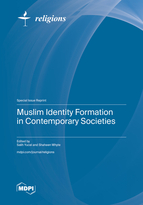Muslim Identity Formation in Contemporary Societies
A special issue of Religions (ISSN 2077-1444). This special issue belongs to the section "Religions and Humanities/Philosophies".
Deadline for manuscript submissions: closed (15 November 2022) | Viewed by 13916
Special Issue Editors
Interests: faith-based movements; Muslims in Australia; Muslim identity; interfaith dialogue
Special Issue Information
Dear Colleagues,
Identity is shaped and cultivated through a myriad of human, individual, and collective experiences, encompassing a broad range of racial, cultural, ethnic, religious, gender, regional, historical, and socio-political realities. As one of the world’s largest and most diverse religious populations, Muslims routinely preserve, negotiate, and develop their identities in accordance with their everyday contexts. This Special Issue of Religions, “Muslim Identity Formation in Contemporary Societies”, seeks to explore new themes and trends emerging in Muslim majority, minority, and diaspora communities. It will critically analyse the intellectual efforts to advance diverse understandings of Muslim identity formation in the wake of new social, cultural, political, intellectual, and technological developments.
Key works on Muslim religious identity include Cara Aitchison, Peter E. Hopkins, and Mei-po Kwan, eds. Geographies of Muslim Identities: Diaspora, Gender and Belonging (Ashgate, 2007); Aaron W Hughes, Muslim Identities: An Introduction to Islam (Columbia University Press, 2013); Derya Iner and Salih Yucel, eds. Muslim Identity Formation in Religiously Diverse Societies (Cambridge Scholars Publishing, 2015), and a range of interdisciplinary works on Muslim identities in the West. The field has since grown to engage in debates about Islamophobia, state politics and Muslim identity construction, trans-locality and imagined communities, Muslim cosmopolitism, hybrid identities, Muslim youth cultures, the securitisation of Muslims, intersectionality, and digital Islam, to name a select few.
This Special Issue invites scholars of Islam, field experts, early researchers, and independent scholars from relevant field disciplines to submit original articles on the topic.
Possible themes and topics of interest include the following:
- Qur’anic and Prophetic understandings of identity, difference, and pluralism
- migration, citizenship, and belonging
- identity formation and state politics
- the umma, trans-locality, and Muslim cosmopolitanism
- Muslim identity politics
- hybrid identities
- the impact of Islamophobia on the formation of Muslim identities
- the projection and representation of Muslims in the media
- securitisation of Muslim identities
- religious identity of young Muslims
- Muslim identities in the digital sphere
- group identities and Muslim subcultures
- intersectionality
- Muslim converts
Dr. Salih Yucel
Dr. Shaheen Whyte
Guest Editors
Manuscript Submission Information
Manuscripts should be submitted online at www.mdpi.com by registering and logging in to this website. Once you are registered, click here to go to the submission form. Manuscripts can be submitted until the deadline. All submissions that pass pre-check are peer-reviewed. Accepted papers will be published continuously in the journal (as soon as accepted) and will be listed together on the special issue website. Research articles, review articles as well as short communications are invited. For planned papers, a title and short abstract (about 100 words) can be sent to the Editorial Office for announcement on this website.
Submitted manuscripts should not have been published previously, nor be under consideration for publication elsewhere (except conference proceedings papers). All manuscripts are thoroughly refereed through a double-blind peer-review process. A guide for authors and other relevant information for submission of manuscripts is available on the Instructions for Authors page. Religions is an international peer-reviewed open access monthly journal published by MDPI.
Please visit the Instructions for Authors page before submitting a manuscript. The Article Processing Charge (APC) for publication in this open access journal is 1800 CHF (Swiss Francs). Submitted papers should be well formatted and use good English. Authors may use MDPI's English editing service prior to publication or during author revisions.
Keywords
- Qur’anic and Prophetic understandings of identity, difference, and pluralism
- migration, citizenship, and belonging
- identity formation and state politics
- the umma, trans-locality, and Muslim cosmopolitanism
- Muslim identity politics
- hybrid identities
- the impact of Islamophobia on the formation of Muslim identities
- the projection and representation of Muslims in the media
- securitisation of Muslim identities
- religious identity of young Muslims
- Muslim identities in the digital sphere
- group identities and Muslim subcultures
- intersectionality
- Muslim converts







